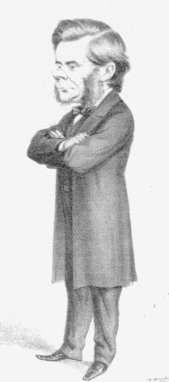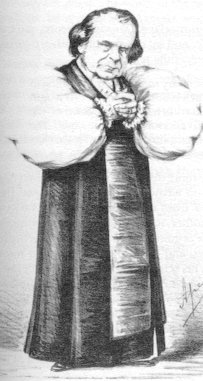Soapy Sam and Huxley
Today, we join the first major battle in a long war. The University of Houston's College of Engineering presents this series about the machines that make our civilization run, and the people whose ingenuity created them.
Author Hal Hellman talks about the day in 1860 when 700 people, many of them Anglican clergy, crowded into a hall at Oxford University. The British Association for the Advancement of Science met to discuss Darwin's new book, The Origin of Species by Means of Natural Selection. Darwin himself was chronically ill and didn't come to Oxford for the meeting. But Darwin never got involved in the kind of combat this meeting was sure to generate.
The person carrying the fight against evolution was an eloquent Anglican Bishop named Samuel Wilberforce. Wilberforce's father had been the driving force behind England's giving up slavery in 1833.
Samuel Wilberforce had been an athlete, mathematician, and debater at Oxford. He'd picked up the name Soapy Sam for his slipperiness in ecclesiastical arguments. He didn't understand biology, and he may not have read Darwin very carefully beforehand. But a naturalist named Richard Owen prepared him. Owen had once mentored Darwin. He'd become increasingly annoyed as Darwin's name grew more lustrous than his own and was happy to join the fight.
So who would speak for Darwin? Who would chance being savaged by the Church's heavy artillery? The obvious candidate was Darwin's most famous supporter, Thomas Huxley. History has called Huxley Darwin's Bulldog. He was feisty enough, but this would be walking into the lion's den.
Another naturalist, Robert Chambers, talked him into attending. The idea of evolution wasn't new. Darwin had simply made sense of it by adding the mechanism of natural selection. Chambers was one of many who'd talked about evolution before Darwin and had been viciously attacked by Wilberforce for doing so.
The meeting began on June 20th, 1860. After long preliminaries, Wilberforce took the podium and began his systematic assault on evolution. At the end, he turned to Huxley and asked if it was his grandfather or grandmother who'd descended from an ape.
Huxley muttered to himself, "The Lord has delivered [Wilberforce] into my hands." The audience began chanting for Huxley to speak. When he did, he finished by saying he'd rather be descended from a monkey than from someone who would so prostitute the truth.
That might well have been the defining moment in the great science-religion debate of the 19th century. One woman screamed and fainted at such an insult to a bishop. The clergy shouted in outrage. The pro-evolution people shouted their support.
We've used military language to describe the debate ever since. In 1925, the Oxford meeting was restaged in Tennessee at the Scopes Trial. William Jennings Bryan played Wilberforce to Clarence Darrow's Huxley. And the battle goes on today. Now it's being fought in our schools. New Wilberforces call up new Huxleys to go at it with little more sense of open inquiry than there was at Oxford, 140 years ago.
I'm John Lienhard, at the University of Houston, where we're interested in the way inventive minds work.
Hellman, H., Great Feuds in Science: Ten of the Liveliest Disputes Ever. New York: John Wiley & Sons, Inc., 1998, Chapter 5.
For another mention of the Oxford meeting, see the end of Episode 1260.


Huxley, from Vanity Fair, 1871 (left), Wilberforce, Vanity Fair, 1869 (right)